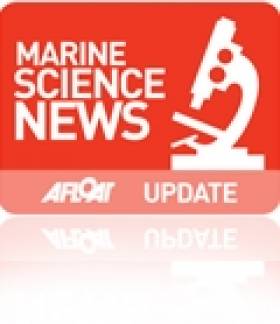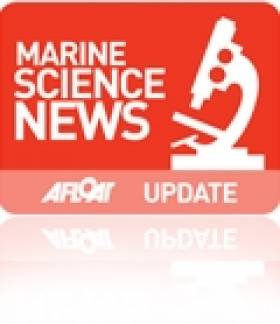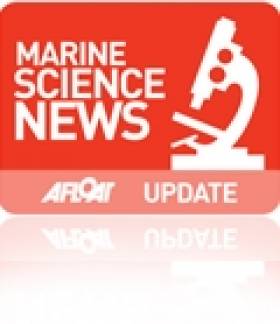Displaying items by tag: SmartBay
Getting Into the Smarts Behind SmartBay as Noise Data Project Switches On
#MARINE SCIENCE - Apart from some of the world's largest concentrations of wave energy, the waters of Galway Bay and the west coast of Ireland are now providing something potentially even more valuable - information.
That's according to IBM's Harry Kolar writing for the blog A Smarter Planet, as he discusses the start of his company's new underwater data collection project developed in association with the Sustainable Energy Authority of Ireland (SEAI) and the Marine Institute.
As previously reported on Afloat.ie, the system comprises an array of noise sensing equipment such as hydrophones deployed in Galway Bay to monitor the noise levels produced by wave energy conversion devices in real time.
This array is attached to a large monitoring buoy about 2km from the southern shore, and constantly transmits the data it records to a receiving system on land.
The scheme, which was finally switched on last month, is an offshoot of the SmartBay initiative for developing and testing new marine technology to foster future commercial development in the fast-growing marine science sector. The 'Twitter buoy' deployed for the Volvo Ocean Race finale recently is another of the project's schemes.
"Initially, the system will capture and analyse the ambient noise of the ocean to establish a baseline of acoustics including natural and anthropogenic (man-made) sound sources including vessel traffic," writes Kolar.
"But the ultimate goal is to capture and analyse the sounds and vibrations of hulking wave energy conversion machines that have begun bobbing along off the coast and help determine what, if any impact the sound waves from those devices could have on marine life – but especially highly sensitive dolphin, porpoise, and whale populations."
A Smarter Planet has much more on the story HERE.
Wavebob Awarded 'Smartbay Innovator of the Year' Award
#marinescience – Wavebob was recognised as one of Ireland's leading engineering and research companies today when they were awarded the SmartBay Innovator of the Year Award. Wavebob was recognised for innovation, engineering and leadership in the emerging wave energy market.
Four additional companies were also recognised for their contribution to innovation and research by leading International Companies. IBM presented an award to SonarSim Ltd; Intel presented an award to Episensor; Veolia presented to Techworks Marine Ltd.; and Microsoft presented an award to IDS Monitoring Ltd., all members of the SmartOcean innovation cluster.
Andrew Parish, CEO of Wavebob said, 'We are delighted to receive this award – it is great recognition from a cluster of companies all working together in the pursuit of commercial opportunities in the marine sector. We have benefited from being part of the SmartOcean innovation cluster through access to world class skill-sets and technology which co-exist in the SME and multinational companies in the cluster. This approach is directly in line with Wavebob's strategy of working with strategic partners."
The awards were announced following the Inaugural SmartOcean Innovation Exchange, as part of the SmartOcean Conference. Sponsored by SmartBay Ireland Ltd, the event was hosted at the Ocean Wealth Pavilion of the Volvo-Global Business Village.
The Innovation Exchange event was designed to support companies to profile their new technologies that address market opportunities in the global marine sector. In total, 22 Companies were recognised by SmartBay Ireland and received the SmartBay Innovator Award. A number of International companies also participated reinforcing the links between the SmartOcean Cluster and related Clusters in Europe and Canada.
Speaking at the event Mike Devane, Chairman of SmartBay Ireland Ltd., said 'This event demonstrates, in the most practical way, how collaboration within a Cluster can help smaller companies gain access to technology and markets through the support of leading Multi Nationals'.
Dr Peter Heffernan, CEO Marine Institute said "We are delighted to be involved in this event supporting small and medium business to develop innovative solutions for the marine sectors. It's great to see 22 Irish and International companies showcasing their innovations and working with multinationals and the research community to examine how we can use technology to make the most of our marine resources."
Marine Sector is Key to Ireland's Future Says President
Marine scientists yesterday welcomed President Mary McAleese on a visit to the Marine Institute headquarters in Oranmore, Co Galway.
The President met many of those involved in the SmartBay project, a network of buoys that uses remote sensing technology to collect and relay data on ocean conditions over long distances.
Institute staff also briefed the President on its programmes to sustainably manage wild fish stocks, ensure seafood safety and protect the marine environment.
“As the resources of the ocean become ever more implicated in the future development of high technologies sectors like energy, ICT, medical and pharma, they will be a key part of Ireland’s future economic story,” said the President.
Dr Peter Heffernan, CEO of the Marine Institute, also highlighted "Ireland’s reputation as an emerging centre of excellence in marine science".
He said this was "validated" by the announcement of €23 million in EU funding for marine research groups and enterprises involved in pioneering areas such as ocean energy and biotechnology.































































